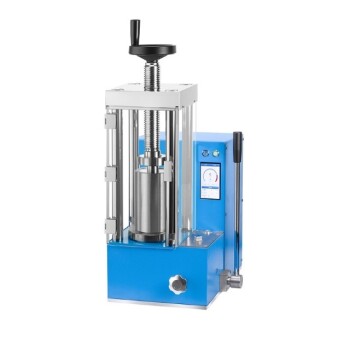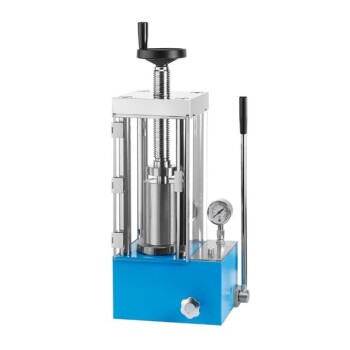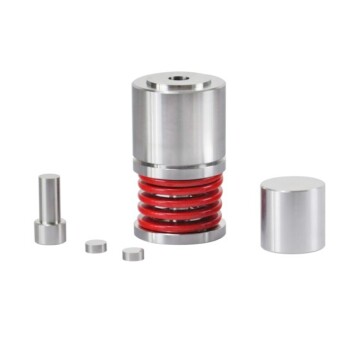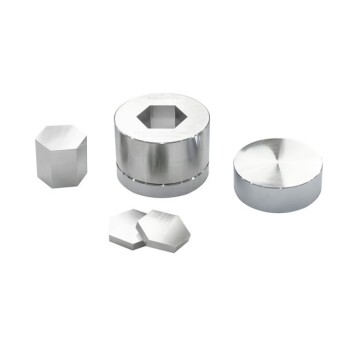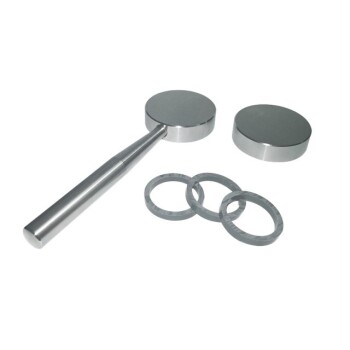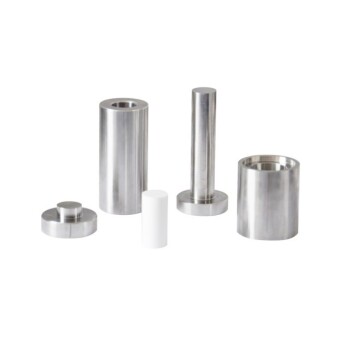In the medical industry, Cold Isostatic Pressing (CIP) is a critical manufacturing process for creating high-performance implants, such as those used in orthopedic and dental surgery. Its primary benefit is the ability to produce components with exceptional density, uniformity, and dimensional accuracy, which directly translates to enhanced patient safety and device reliability.
The core advantage of CIP is its use of uniform, all-sided pressure. This eliminates the density variations and internal stresses common in other pressing methods, yielding medical implants with superior structural integrity and predictable performance.
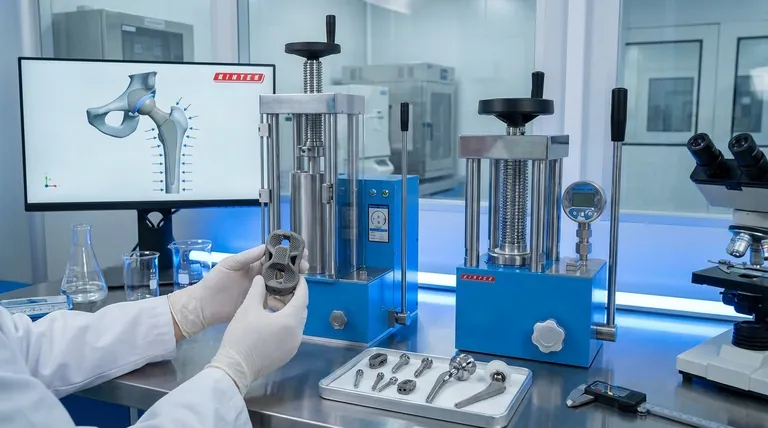
Why Uniform Pressure is a Game-Changer for Implants
The term "isostatic" means uniform pressure from all directions. This fundamental principle is what gives CIP its unique advantages for producing mission-critical medical components.
Achieving Superior Material Density
Unlike traditional pressing, which applies force from one or two directions, CIP submerses a powder-filled, flexible mold in a fluid and pressurizes the entire chamber. This all-sided compression compacts the powder more effectively, significantly reducing voids and achieving a higher, more uniform "green" density before the final sintering (heating) stage.
Ensuring Consistent Material Properties
An implant's structural integrity depends on its material properties being consistent throughout. The uniform density achieved by CIP ensures that characteristics like hardness, strength, and fatigue resistance are predictable across the entire component, from the surface to the core.
Eliminating Internal Stress Points
Directional pressing can create internal stress lines and shear planes—microscopic weak points where a fracture could one day originate. CIP’s gentle, uniform pressure compacts the powder without introducing these internal stresses, drastically reducing the risk of catastrophic implant failure under long-term use.
The Tangible Benefits in Medical Applications
The theoretical advantages of CIP translate directly into practical benefits for producing safe and effective medical devices.
Precision for Complex Geometries
CIP is exceptionally well-suited for producing components with irregular shapes or a long aspect ratio, such as custom dental implants or spinal fusion cages. The flexible mold and uniform pressure allow for the creation of complex geometries that would be difficult or impossible to form in a rigid, uniaxial die.
Reliability in High-Stress Implants
Orthopedic implants for hips and knees must withstand immense and repetitive mechanical stress for decades. The high, uniform density and lack of internal weak points make CIP an ideal method for producing these load-bearing components, ensuring their long-term reliability and performance.
Enhanced Safety and Performance
A denser, less porous implant surface is inherently more resistant to wear and corrosion. This superior surface finish, achieved through CIP, contributes to better biocompatibility and the overall longevity of the device within the human body.
Understanding the Operational Advantages and Considerations
Beyond the quality of the final product, CIP offers distinct operational benefits, but it's important to understand its place within the larger manufacturing workflow.
Efficiency with Difficult-to-Press Powders
Many advanced ceramics and metal alloys used in medical applications are notoriously difficult to compact using traditional methods. CIP excels with these materials, enabling the production of high-performance implants from the most advanced powders available.
Reduced Waste and Cost-Effectiveness
By forming a "green" part that is very close to the final desired shape (near-net shape), CIP minimizes the need for extensive post-press machining. This reduces material waste, shortens production time, and lowers overall manufacturing costs, making it economically viable for large-scale production.
Consideration: It's One Step in a Process
It is crucial to recognize that CIP is a powder-compaction step that produces a fragile "green" part. This part must undergo a subsequent high-temperature sintering or Hot Isostatic Pressing (HIP) step to fuse the particles and achieve its final, full-density material properties. The overall success depends on optimizing this entire workflow.
Making the Right Choice for Your Application
To determine if CIP is the right process, you must evaluate it against your primary manufacturing goal.
- If your primary focus is patient safety and device longevity: CIP's ability to create highly uniform, dense structures minimizes the risk of implant failure from material inconsistencies.
- If your primary focus is manufacturing complex or irregular shapes: The flexible tooling and isostatic pressure of CIP allow for component geometries that are often impossible with rigid, uniaxial dies.
- If your primary focus is material efficiency and cost control: CIP excels at forming near-net-shape parts from difficult-to-press powders, reducing both material waste and subsequent machining costs.
By understanding its fundamental principles, you can leverage CIP to set a new standard for quality and reliability in your medical device manufacturing.
Summary Table:
| Benefit | Description |
|---|---|
| Superior Density | Achieves high, uniform density in implants, reducing voids and enhancing structural integrity. |
| Uniform Material Properties | Ensures consistent hardness, strength, and fatigue resistance across components. |
| Elimination of Internal Stresses | Prevents weak points and reduces risk of implant failure under long-term use. |
| Precision for Complex Geometries | Ideal for irregular shapes like dental implants and spinal cages with flexible molds. |
| Cost-Effectiveness | Reduces material waste and machining needs through near-net-shape production. |
Upgrade your medical device manufacturing with KINTEK's advanced lab press machines! Our automatic lab presses, isostatic presses, and heated lab presses are designed to deliver the precision and reliability you need for producing high-performance implants. Whether you're focused on enhancing patient safety, creating complex geometries, or optimizing costs, KINTEK provides tailored solutions for your laboratory. Contact us today to learn how our expertise can benefit your projects and drive innovation in the medical industry!
Visual Guide
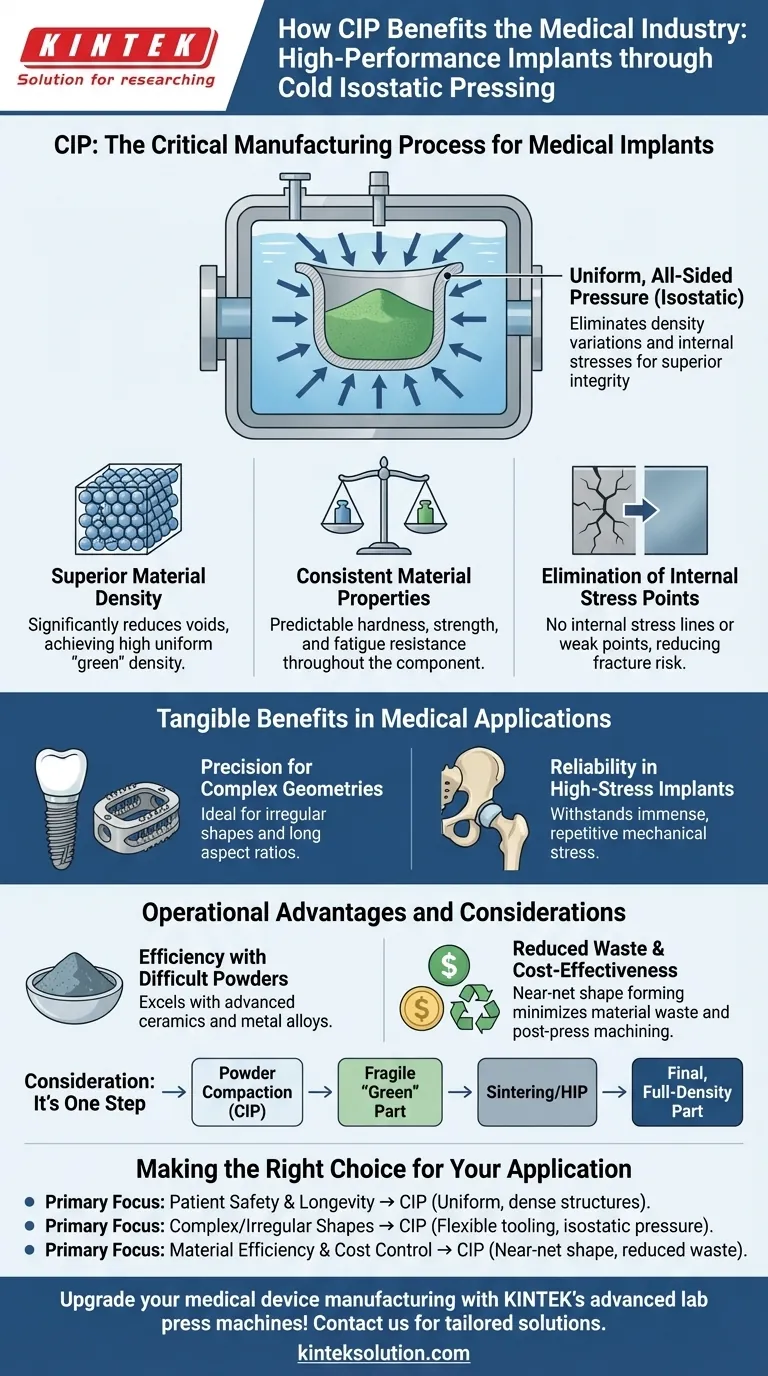
Related Products
- Electric Lab Cold Isostatic Press CIP Machine
- Electric Split Lab Cold Isostatic Pressing CIP Machine
- Manual Cold Isostatic Pressing CIP Machine Pellet Press
- Automatic Lab Cold Isostatic Pressing CIP Machine
- Lab Round Bidirectional Press Mold
People Also Ask
- What industries benefit from Cold Isostatic Pressing technology? Ensure Reliability in Aerospace, Medical, and More
- Why is a Cold Isostatic Press (CIP) required for the formation of Nb-Ti alloy green compacts? Ensure Density Uniformity
- What are the characteristics of the isostatic pressing process? Achieve Uniform Density for Complex Parts
- What are some examples of applications for cold isostatic pressing? Boost Your Material Performance with Uniform Compaction
- What are the two main techniques used in cold isostatic pressing? Wet-Bag vs. Dry-Bag Methods Explained
